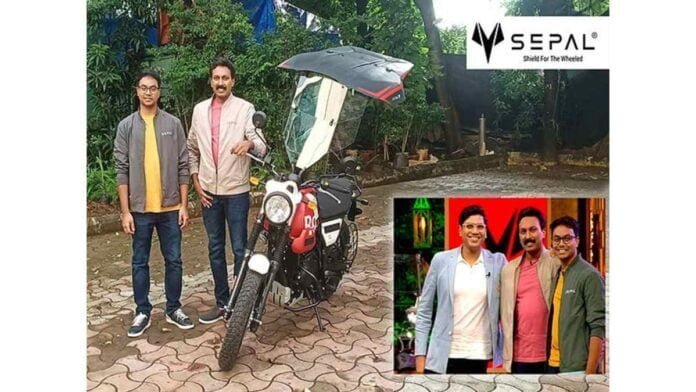SEPAL, a truly Made-in-India product, secured Rs 50 lakh in funding in the second season of the popular business reality show Shark Tank India. The company accepted the offer of Lenskart’s Peyush Bansal for 2 per cent equity.
SEPAL, a true Made-in-India product, is the world’s first motorcycle canopy, shielding thousands of bike riders from the sun, rain, cold, and pollution.
SEPAL, an officially recognised Indian start-up founded by two IITian brothers, has received Rs 50 lakh in investment in the second season of the renowned business reality programme Shark Tank India. The firm accepted Peyush Bansal of Lenskart’s offer of 2% stock. The firm indicated that the monies generated will be used to expand their enormous production for large masses across the country.
SEPAL appears to have sparked a debate amongst supporters and detractors over whether it makes sense to have a big windscreen and canopy on your motorcycle. Even the sharks themselves appear to be split over SEPAL. With Peyush Bansal on one side pulling for the bigger picture of what SEPAL could achieve if done well, and the rest of the sharks still unsure whether an ordinary man would dare spend a few thousand dollars for taking care of himself and his family while riding a motorcycle.
People can’t seem to ignore it, whether they hate it or love it, which is why the SEPAL team wound up on Shark Tank, according to Kashyap Addepally, co-founder of SEPAL. “We hadn’t contemplated coming to Shark Tank until people started bombarding us with messages, some cynically to be roasted by the sharks, and others who were sincerely pulling for SEPAL.”
Whether or not SEPAL is a lifesaver for the majority of two-wheeler riders, it is a reality that in India, one in every three adults relies on a two-wheeler for a living and daily requirements. Nobody can dispute the difficulties they confront on a daily basis.
Windblasts, which are uncomfortable and freezing in the winter and tiring and dehydrating in the summer, are some of the most serious problems that a two-wheeler rider faces. And what about city pollution? Nowadays, city pollution (with all of its construction sites, garbage trucks, and diesel cars) is known for making bike riders disoriented after a long journey.
Interestingly enough, in the words of Vidhey Addepally, co-founder of SEPAL,”we at SEPAL have set out to equip all the two-wheeler riders with not just the physical pleasures of a vehicle but with all the entertainment capabilities present in EVs as well”.
This prompted Peyush to investigate SEPAL’s IoT module and App capability, which is so impressive that it can transform an old Hero Honda bike into a Smart Vehicle on par with Ola and Ather. That is a serious combination of Hardware and Software for a start-up to come up with, along with the massive size of the two-wheeler market in India and abroad, which must have convinced both Vidhey to drop out of his Stanford admission and Kashyap to abandon his thriving Design Practice to build for 21st century India.
Whether or not the Sharks were pleased by SEPAL, Peyush appears to believe that SEPAL represents a potential to develop a completely new sector rather than simply entering an existing one.
Is Peyush’s gamble to back SEPAL a good one? Only the market will be able to tell.
For the time being, something appears to be working in SEPAL’s favour, as it has been an online phenomenon since its inception in February 2022, and people from all walks of life appear to be using SEPAL.
Parents use it to transport their children to school, while other IT personnel, students, marketers, and salesmen use it for their everyday journeys.
SEPAL is also gaining popular among bike riding groups since it is extremely beneficial on extended journeys. SEPAL is interestingly utilised in 25 Indian states and sold to various overseas places.
For latest Bollywood Update Follow us on Instagram & Watch on Youtube



